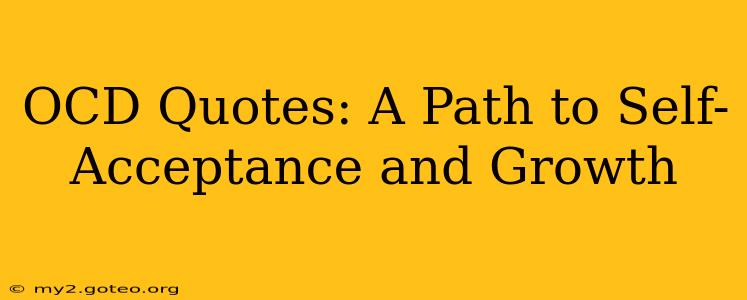Obsessive-Compulsive Disorder (OCD) is a complex mental health condition affecting millions worldwide. Living with OCD can be challenging, marked by intrusive thoughts (obsessions) and repetitive behaviors (compulsions) that significantly impact daily life. Finding solace and understanding can be a journey, and often, the words of others—whether experts, fellow sufferers, or insightful thinkers—can offer comfort, validation, and a pathway towards self-acceptance and growth. This post explores powerful OCD quotes that resonate with the lived experience of OCD, offering hope and guidance on the path to recovery.
Understanding OCD: Beyond the Stereotypes
Before diving into the quotes, it's crucial to understand that OCD is far more nuanced than commonly portrayed. It's not about simply being tidy or organized; it's a debilitating condition characterized by persistent, unwanted thoughts and the overwhelming urge to perform specific rituals to alleviate anxiety. These obsessions and compulsions are not choices; they are symptoms of a complex neurological disorder.
Powerful OCD Quotes Offering Hope and Understanding
Many individuals find strength and comfort in quotes that reflect their internal struggles and offer a sense of hope. Here are some examples:
"The mind is a terrible thing to waste, but a wonderful thing to tame." This quote, while not explicitly about OCD, speaks to the power of self-mastery and the potential for growth, even amidst the chaos of intrusive thoughts. Learning to manage, rather than be controlled by, the mind is a central aspect of OCD recovery.
"The only way out is through." This quote highlights the importance of facing one's fears and confronting the obsessions and compulsions head-on. Avoidance, while tempting, only strengthens the cycle of OCD. Exposure and Response Prevention (ERP) therapy, a common and effective treatment, is built upon this principle.
"Progress, not perfection." This is a vital mantra for individuals struggling with OCD. Recovery is not a linear path; setbacks are inevitable. Focusing on progress, no matter how small, helps maintain hope and prevents discouragement.
What are the different types of OCD?
OCD presents differently in individuals. While the core features—obsessions and compulsions—remain consistent, the specific content of these can vary widely. Some common types include:
- Contamination OCD: Fear of germs, dirt, or contamination, leading to excessive cleaning rituals.
- Harm OCD: Fear of harming oneself or others, often manifesting as checking behaviors.
- Symmetry/Order OCD: Obsessive need for symmetry, order, and precision, resulting in repetitive arranging or counting.
- Religious OCD: Intrusive blasphemous or sacrilegious thoughts leading to compulsive prayers or rituals.
How can I tell if I have OCD?
If you're concerned you might have OCD, it's essential to seek professional help. A mental health professional can conduct a thorough assessment to determine a diagnosis. Symptoms indicative of OCD typically include:
- Recurring intrusive thoughts: These thoughts are often unwanted, disturbing, and cause significant distress.
- Repetitive behaviors or mental acts: These compulsions are performed to reduce anxiety associated with the obsessions.
- Significant time commitment: OCD symptoms consume a considerable amount of time each day, interfering with daily activities.
- Significant distress or impairment: The symptoms cause clinically significant distress or impairment in social, occupational, or other important areas of functioning.
What is the best treatment for OCD?
The gold standard treatment for OCD is a combination of therapy and, in some cases, medication. Cognitive Behavioral Therapy (CBT), specifically Exposure and Response Prevention (ERP), is highly effective in helping individuals manage their symptoms. Medication, such as selective serotonin reuptake inhibitors (SSRIs), can be helpful in reducing the severity of symptoms, often used in conjunction with therapy.
Are there any self-help techniques for managing OCD?
While professional help is crucial, several self-help techniques can complement treatment and improve daily management. These include:
- Mindfulness and meditation: These practices can help individuals become more aware of their thoughts and feelings without judgment.
- Stress management techniques: Reducing stress levels can lessen the intensity of OCD symptoms.
- Self-compassion: Treating oneself with kindness and understanding is vital throughout the recovery process.
Conclusion: Embracing the Journey
Living with OCD requires courage, resilience, and self-compassion. While the journey can be challenging, the right support, treatment, and a positive mindset can lead to significant improvement and a better quality of life. The quotes shared here serve as a reminder that you are not alone and that healing and growth are possible. Remember to seek professional help if you are struggling with OCD; recovery is achievable with the right support.

